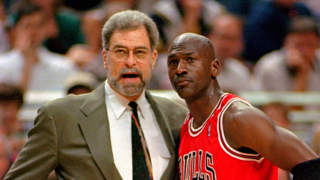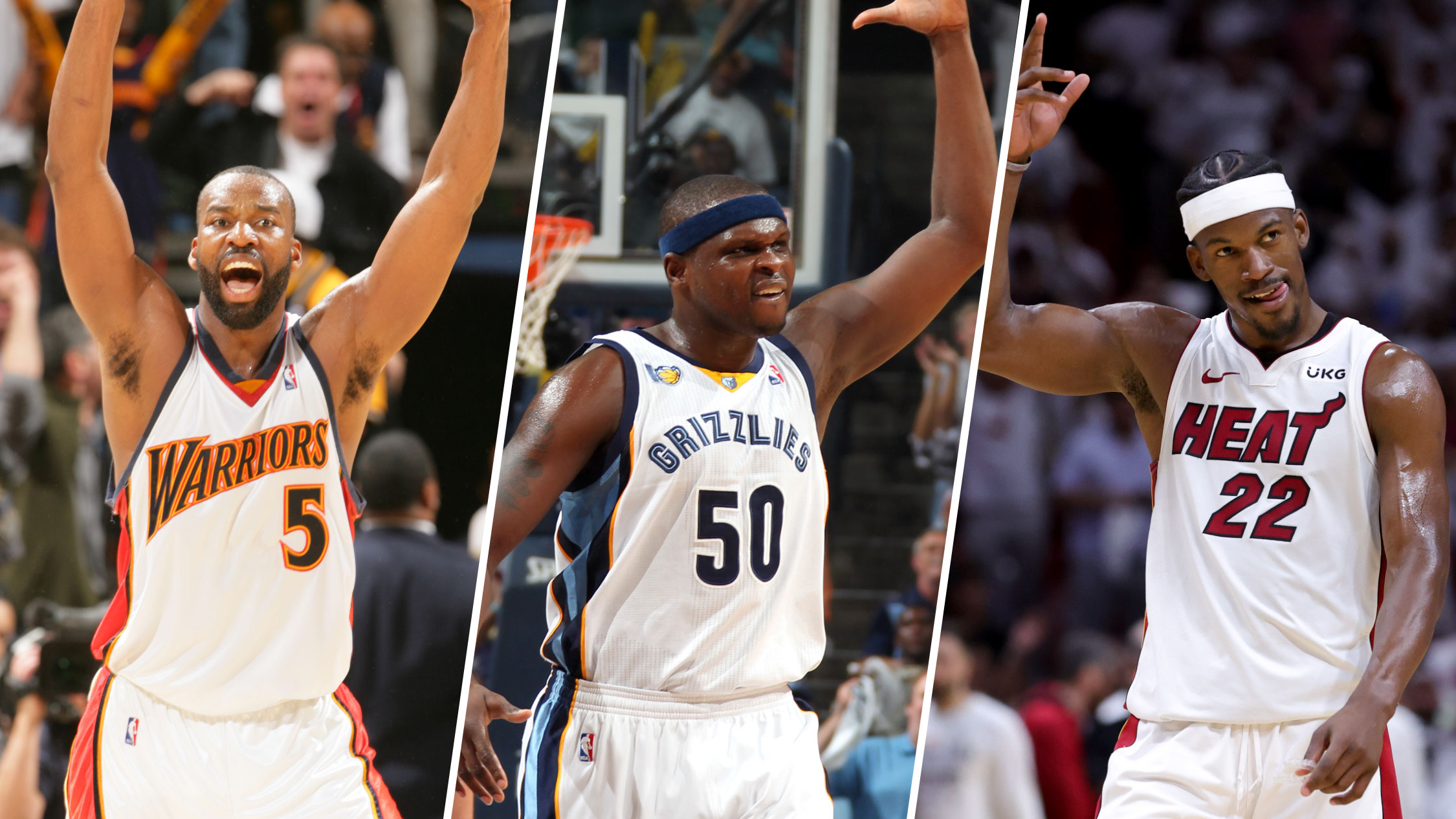
Editor's Note: Over the next week, NBC Sports Chicago and NBC Sports Bay Area will try to settle the debate about which is the best NBA team of all time: the 1995-96 Bulls or the 2016-17 Warriors. Check out NBCSportsBayArea.com for the Warriors perspective.
Over the past week, NBC Sports Chicago and NBC Sports Bay Area have been trading blows debating topics related to a central, timeless NBA debate — Which team was better: The 1995-96 Bulls or the 2016-17 Warriors?
Now, we arrive at a breakdown of the coaches. Phil Jackson vs. Steve Jerr. The (Zen)master vs. the disciple.
And frankly, while we appreciate the thought, this one hardly qualifies as a debate. Phil Jackson is the better coach seven days a week and twice on Sundays. There isn’t much of an argument to be had here, but let’s break it down anyways. Objective reporter hat: On.
First, the resumes. A rundown of each of the coach’s accolades skews wildly in Jackson’s favor.
Inhale.
In 20 seasons at the helm of the Bulls and then the Los Angeles Lakers, the Zenmaster won 11 NBA championships (as noted by our Chris Kamka, a .550 title percentage is better than the win percentage of the three current playoff teams). Embedded in those 11 titles are three three-peats — two with the Bulls (1991-93; 1996-98) and one with the Lakers (2000-02). Worth noting: The second Bulls’ three-peat and the Lakers’ three-peat came consecutively for Jackson, who jetted straight back to the top after one year away from coaching following the Bulls’ "last dance" in 1998-99. Jackson ranks seventh all-time in regular season wins (1,155), but did it in fewer games and seasons than anyone else in the top 10. He’s first in playoff wins (229) by a mile. He’s third all-time in both regular season win percentage (.704) and playoff win percentage (.688). But longevity is the key: Jackson is the only coach in the top five all-time in regular season win percentage with more than eight years of experience, and the only coach in the top eight in playoff win percentage to coach more than nine years. His 13 conference championships and 11 NBA titles (with an 11-2 Finals record) are both records. If you restricted this conversation to just Jackson's time with the Bulls, his six titles and six conference championships would rank third all-time, and he did that in nine seasons. He never coached a team with a below-.500 record.
NBA
Exhale.
So, yeah. On numbers, alone, there is simply no one in Jackson’s stratosphere. His hardware is without comparison.
But maybe that’s not fair to Kerr. After all, Jackson had nearly four times as many years and games to amass those figures, and Kerr is already incredibly decorated just six seasons into his head coaching career. In fact, he’s pretty much on Jackson’s level in every statistical measure — if not above — after six seasons (or five-plus in Kerr's case, as the fate of the 2019-20 season still hangs in the balance):
| Games | Reg. season record | Playoff record*** | NBA titles | Conference titles | Coach of the Year awards | |
| Steve Kerr | 475 | 337-138 (.704*) | 77-28 (.733**) | 3 | 5 | 1 |
| Phil Jackson**** | 492 | 342-150 (.695) | 66-28 (.702) | 3 | 3 | 1 |
*First all-time
**Second all-time
***The NBA switched to best-of-seven first round series in 2003. Jackson’s Bulls owned a record of 27-2 in nine best-of-five first round series in his tenure. Adjusted for inflation, Jackson's early-career playoff record would likely be even better.
****Jackson’s career regular season (.704) and postseason win percentages (.688) each rank third all-time. Those in front of him? Kerr and *rubs eyes* David Blatt in regular season win percentage. Nick Nurse and Kerr in postseason win percentage.
Now, further in Kerr's defense, his regular season win-loss record might be even gaudier without the confluence of severe injuries to Steph Curry and Klay Thompson (and departure of Kevin Durant) that have hampered the Warriors so far in 2019-20. When the NBA indefinitely suspended play, Golden State owned the worst record in the league at 15-50, but it’s hard to peg that entirely — if even partially — on Kerr.
The rub, though, is that for Kerr to keep up with Jackson by the numbers throughout his career, he would basically have to sustain his current level of success four times over. I’m happy to be proven wrong, but that doesn’t feel plausible given the Warriors’ trajectory and with the amount of player movement in today’s game. Again, it’s not just Jackson’s excellence, but his longevity, that astounds.
But wait, you say. Jackson always had stacked rosters. Anyone could have rattled off six titles in eight years with prime Michael Jordan and Scottie Pippen, and a host of perfectly cast role players. And what a chore that Lakers’ three-peat must have been to manufacture, with only a young Kobe Bryant and peak Shaquille O’Neal to build around. Kerr was the missing piece to the Warriors’ dynasty coming to fruition!
The rebuttal there is two-pronged. For one, the bulk of the Warriors’ postseason success (two of Kerr’s three titles, 46 of his 77 postseason wins) came after Durant made the Warriors the most brazenly constructed superteam of all time. Their 73-win 2015-16 regular season came before adding Durant, but their loss in unprecedented fashion in the Finals (they remain the only team to squander a 3-1 Finals lead) is an unscrubbable mark on Kerr's record. It also warrants mention that Luke Walton presided over that team through its first 43 regular season games (going 39-4 and winning two Coach of the Month awards) while Kerr rehabbed a back injury until Jan. 22. It's impossible to know exactly how much Kerr was involved with the team's operations while sidelined, and he deserves credit for developing them into the juggernaut they were (he is officially credited for those wins and losses), but again, it's worth noting.
And secondly: Yes Jackson’s rosters were also loaded, but his unconventional yet progressive coaching methods were almost as instrumental to maximizing his talent as the players, themselves, were. Those Bulls teams of the ’90s were a hotbed of potentially flammable personalities. The perpetual tension in Bryant and O’Neal’s relationship is well-documented. The thread that united those teams and drove them to the highest levels of achievement was the Zenmaster and his inclusive, contemplative approach. Jordan famously refused to play for another coach. Toni Kukoc recently lauded Jackson as a leader who went beyond X's and O's to truly get to know his players. Kerr, himself, said he “wouldn’t have become the coach of the Golden State Warriors if [he] hadn’t had [his] experience with the Bulls,” citing the tutelage of Jordan, Pippen and Jackson as essential to his later success as a player, broadcaster and coach. The list goes on.
That’s not to say Kerr isn’t a deft communicator, though the quick unraveling of Durant’s Warriors tenure is a slight mark against him. But Jackson is the best to ever do it, and he proved it at multiple stops. Jackson’s first and last titles came 19 years apart — for different franchises — and he employed the same strategic (the triangle offense) and interpersonal coaching methods throughout. His is a staggering, wide-spanning career. Kerr’s is, thus far, impressively decorated to the point of Hall of Fame deservedness, but there’s a chasm to clear before he reaches Jackson’s level of acclaim.
Of course, anything is possible. Kerr could one day reach the statistical and mythological heights Jackson achieved in his two decades in the league. But that day is not today. Jackson is the better coach. And for now, it’s not particularly close.
Click here to download the new MyTeams App by NBC Sports! Receive comprehensive coverage of your teams and stream the Bulls easily on your device.


